Will women in seafood catch on?
- Like
- Digg
- Del
- Tumblr
- VKontakte
- Buffer
- Love This
- Odnoklassniki
- Meneame
- Blogger
- Amazon
- Yahoo Mail
- Gmail
- AOL
- Newsvine
- HackerNews
- Evernote
- MySpace
- Mail.ru
- Viadeo
- Line
- Comments
- Yummly
- SMS
- Viber
- Telegram
- Subscribe
- Skype
- Facebook Messenger
- Kakao
- LiveJournal
- Yammer
- Edgar
- Fintel
- Mix
- Instapaper
- Copy Link
Posted: 25 June 2020 | Mecca Ibrahim | No comments yet
Mecca Ibrahim, co-founder of Women In The Food Industry and member of the New Food advisory board, interviews six established women in the seafood industry, to hear their stories and learn how we can encourage more women to follow suit.
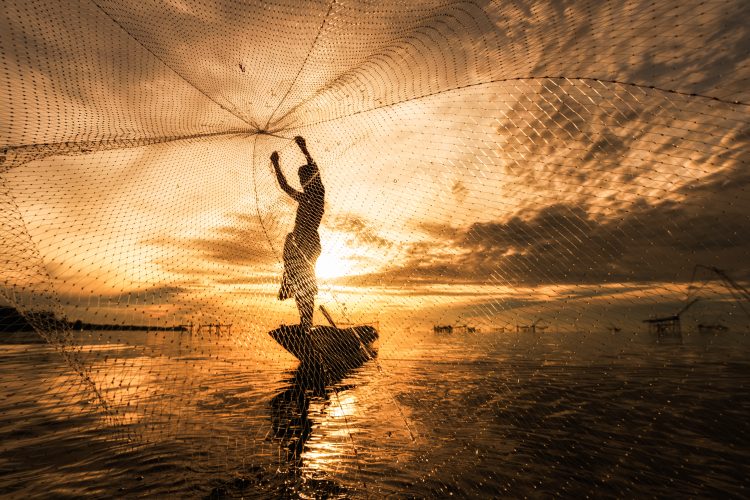

Fishing vessel crews are almost entirely male, yet women make up a large proportion of workers on the land, mending nets or picking shellfish from sand. As co-founder of Women In The Food Industry, I was curious as to why this was the case, so asked several women in the seafood market why they felt this pattern has continued into the 21st century and to share their thoughts on how we might improve the visibility of women in the seafood industry.
Loren Hiller, Commercial Officer at Marine Stewardship Council (MSC):
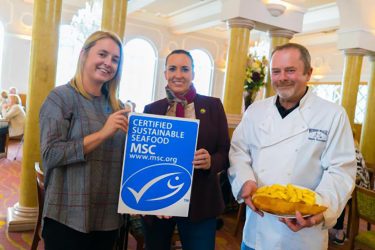

Loren Hiller (far left), Commercial Officer at Marine Stewardship Council
Generally, women tend to play a small role in the ‘catching sector’ but that’s not surprising, given the pressures that discourage women from entering the sector. Fishing tends to stand out as an activity that doesn’t make women feel welcome. I think this has continued into the 21st century for various reasons, unfortunately – although I would love to see it change! Perhaps it’s due to stereotypical reasons such as females having an apparent lack of required strength and that fishing is a dangerous livelihood?
A key point to remember is the important role of women as the support system for their seagoing spouses; this is generally unrecognised and explains why more women stay at home to look after the family, rather than allowing them to pursue a career at sea. When considering the seafood industry as a whole, with fisheries, aquaculture, seafood processing and all related services, women represent half of the total working population worldwide1 and over 90 percent of the processing sector is female.
It would be great to see more females on board and at sea and dispelling myths. Anecdotally, a Norwegian fishing vessel owner recently told me they have started hiring more females to work on board and go out on the long fishing trips, which I was really excited about. He said the dynamic has changed and he hopes to see it continue across other vessels.
A 2017 report by Women in Seafood International2 states there is still a strong gendered division of labour where women occupy low revenue jobs and remain partially absent at the other end of the value chain. I believe this is one of the biggest challenges we face.
Fishing vessel crews are almost entirely male, yet women make up a large proportion of workers on the land, mending nets or picking shellfish from sand. As co-founder of Women In The Food Industry, I was curious as to why this was the case, so asked several women in the seafood market why they felt this pattern has continued into the 21st century and to share their thoughts on how we might improve the visibility of women in the seafood industry.
Loren Hiller, Commercial Officer at Marine Stewardship Council (MSC):


Loren Hiller (far left), Commercial Officer at Marine Stewardship Council
Generally, women tend to play a small role in the ‘catching sector’ but that’s not surprising, given the pressures that discourage women from entering the sector. Fishing tends to stand out as an activity that doesn’t make women feel welcome. I think this has continued into the 21st century for various reasons, unfortunately – although I would love to see it change! Perhaps it’s due to stereotypical reasons such as females having an apparent lack of required strength and that fishing is a dangerous livelihood?
A key point to remember is the important role of women as the support system for their seagoing spouses; this is generally unrecognised and explains why more women stay at home to look after the family, rather than allowing them to pursue a career at sea. When considering the seafood industry as a whole, with fisheries, aquaculture, seafood processing and all related services, women represent half of the total working population worldwide1 and over 90 percent of the processing sector is female.
It would be great to see more females on board and at sea and dispelling myths. Anecdotally, a Norwegian fishing vessel owner recently told me they have started hiring more females to work on board and go out on the long fishing trips, which I was really excited about. He said the dynamic has changed and he hopes to see it continue across other vessels.
A 2017 report by Women in Seafood International2 states there is still a strong gendered division of labour where women occupy low revenue jobs and remain partially absent at the other end of the value chain. I believe this is one of the biggest challenges we face.
In order to improve women’s visibility, let’s start creating opportunities and a nurturing work environment that promotes and develops key skill sets. It is not just women who need to lead this conversation, but men must also be engaged so that policies can be adopted and enshrined that encourage businesses to recognise and reward talented women who can add huge value to the workplace.
CJ Jackson, Chief Executive of Billingsgate Seafood School, a chef and cookery writer, and regular contributor on seafood to television shows such as Sunday Brunch.
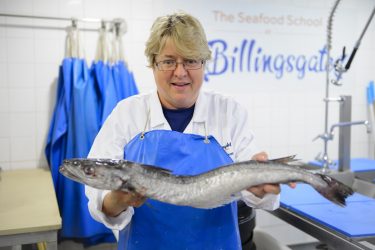

CJ Jackson, Chief Executive of Billingsgate Seafood School
We should be encouraging women to get involved in certifications such as the Master Fishmonger Standard (MFS). There are several levels to consider and numerous women have been accredited now, with more coming forward.
There are many superstitions surrounding the industry and women on board boats – fortunately, they are largely disappearing now; but to be fair, it is a very challenging and dangerous job often with long days at sea. However, I do know of a few women who are successfully involved in this side of the industry. My inspiration here is drawn from a single lady who gill nets in the challenging waters of Cordova in Alaska – all on her own for the salmon openers.
Elit Rowland, Head of Communications at JJ Service. She helped organise the first Women in Fish and Chips Conference.
Fish and chips as a business is similar to wholesale – many businesses are family owned and there’s a lack of diversity at the top. We know that diversity is good for businesses in terms of performance and also for brand image, so we set up ‘Women in Fish and Chips’ to help females in the fish and seafood sector to connect and grow. We also wanted to inspire more women to join and progress within the industry.
According to our Women in Fish and Chips 2019 survey, the main reason people attended was to meet other successful fish and chip shop workers and gain insight in several areas.
Attendees were keen to learn how to motivate and lead teams, balance home and work life better and understand how to grow and expand their businesses.
One of the best ways to attract more females into an industry is to showcase existing talent. Our speakers included some of the UK’s top shops, including Krispies, Nana Jans, Burton Road and the Wetherby Whaler.
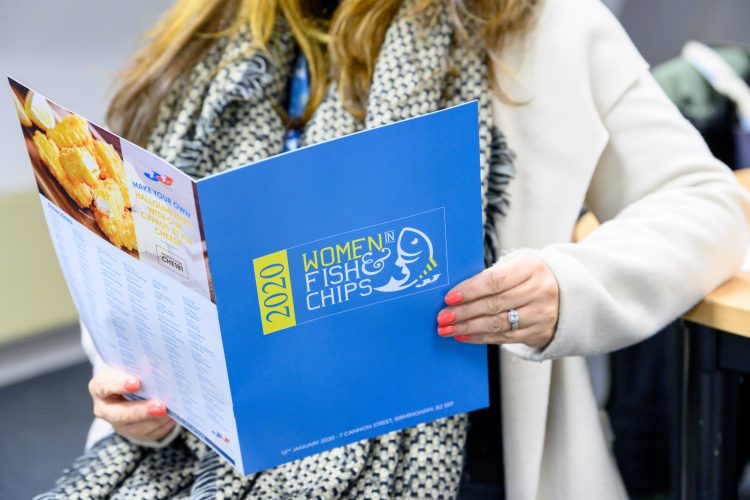

Women in Fish and Chips Conference
Sarah Heward, Joint Owner of The Real Food Café in the remote Highland village of Tyndrum, spoke at the Women in Fish and Chips event. Sarah transformed a derelict Little Chef into an award-winning fish and chip shop with a turnover in excess of £1 million.
Sustainability is a big challenge for the fish and chip industry. The National Federation of Fish Friers is working hard alongside The Marine Stewardship Council (MSC) to try and get more shops to join the MSC Chain of Custody (as we have). This entitles a shop to use the blue ecolabel on its menu for the supply of sustainable fish.
Another challenge is the move to vegetarian and veganism. This is something the traditionalists in the trade are finding hard to grasp; but it’s happening and needs to be embraced.
We are developing a vegan fish and chip offering and we have six other vegan menu items on the menu, along with vegetarian offerings. We are constantly reviewing and adding to this too. Food provenance is a key challenge for many in the industry. The MSC Chain of Custody helps with this, as does the National Fish & Chip Awards organised by Seafish.
The quality card is key for small independents as this is where we can outmanoeuvre the big names in fast food. Evidence shows that the public will pay a premium for quality, so it’s vital to deliver on the promise and price accordingly.
“The quality card is key for small independents as this is where we can outmanoeuvre the big names in fast food”
For women looking to move into a career in the fish and chips industry, keep things simple to start with, develop as you go along, and get established. Don’t get carried away with enthusiasm. Do your research thoroughly and take advice from people who will challenge your thinking, not just tell you what you want to hear! Make time for yourself and keep your mental and physical health in good shape. Your business will only be as healthy as you are. Being an ambitio
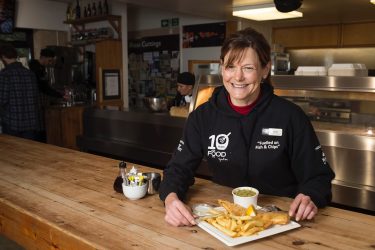

Sarah Heward, Joint Owner of The Real Food Café
us overachiever, I have historically underrated this and caused myself and my team to burn out. It also didn’t make me a very nice person to work with.
Make sure you have adequate insurance too. When my husband died very suddenly and unexpectedly 14 months in, we had no life insurance in place, so this meant I was left with the grief of his death and the distress of trying to juggle everything, including all the debt, on my own.
Never give up, no matter how hard it gets. Running your own business can be very isolating, so join business networking groups and attend industry events. Make sure you have support in place somewhere. Finally, figure out how to pass the baton on before you go past ‘your sell by date’ and make time to celebrate and enjoy the successes – you’ve earned them!
Kirsty Scobie and Fenella Renwick both have experience in catering and the fishing industry in the Highlands of Scotland. They set up The Seafood Shack in Ullapool to offer top quality seafood that is caught and landed locally and are winners of numerous food awards.
When we started The Seafood Shack it didn’t really cross our minds to be representing women, but when people see us and the work we do, we hope it does have a knock-on effect for other women. We have had girls who have come up to us and say, ‘It’s great what you are doing’. It is hard graft to work on the boats, but it is possible and we need to show more photos of women fishing and starting up businesses. Women need the confidence, especially in kitchens, to go for it and bulldoze their way through.
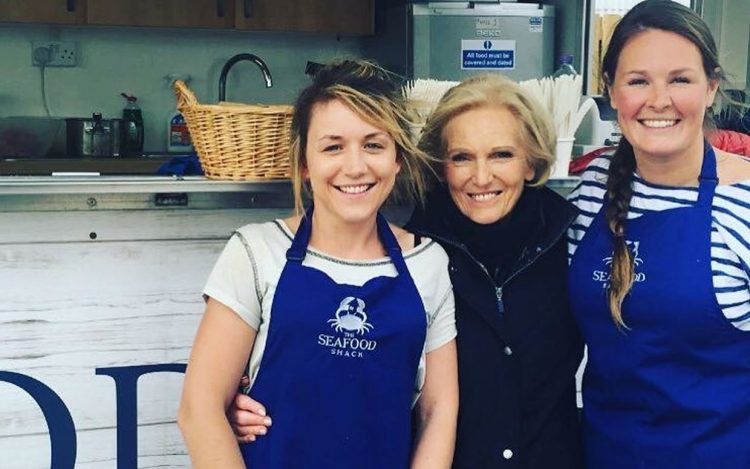

Kirsty Scobie and Fenella Renwick with British food writer, chef and TV presenter, Mary Berry
References
- World Bank, 2012; OECD, 2014
- https://wsi-asso.org/wp-content/uploads/2018/02/WSI-WATCH-2017.pdf
About the author
Mecca Ibrahim was formerly Head of Marketing & Social Media at Great British Chefs – the UK’s fastest growing food website. After almost eight years in that role, she co-founded ‘Women In The Food Industry‘ – an initiative that shines a spotlight on the work of inspiring women in the industry. She has also set up a freelance social media, marketing and content creation agency, and is a member of the Guild of Food Writers. Her expertise includes sustainability, food entrepreneurs, equality within the food industry and ethical eating.
Issue
Related topics
Related organisations
Billingsgate Seafood School, JJ Service, Marine Stewardship Council (MSC), The Seafood Shack, Women In The Food Industry
Related people
CJ Jackson, Elit Rowland, Fenella Renwick, Kirsty Scobie, Loren Hiller, Mary Berry, Sarah Heward








